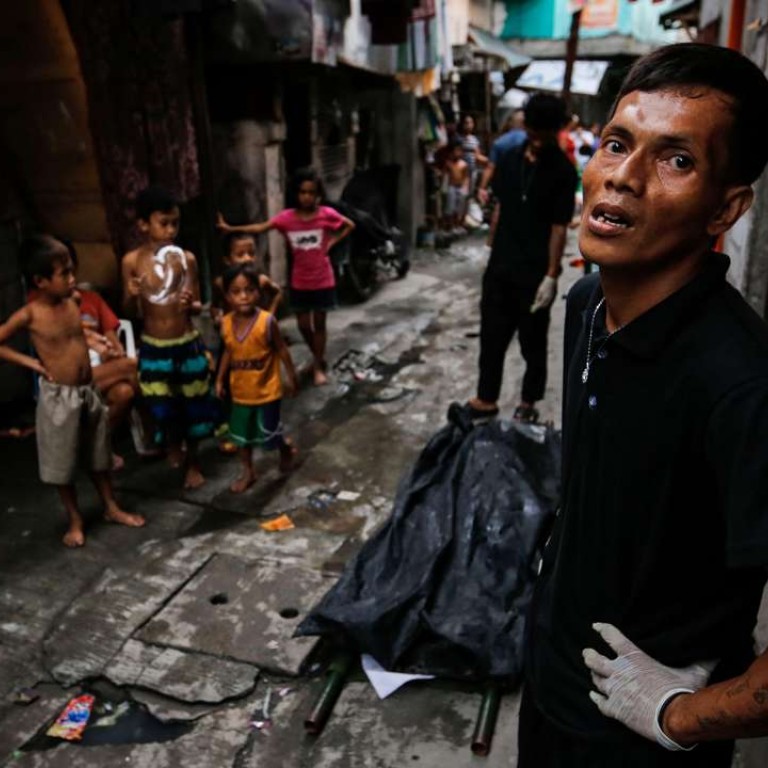
Duterte’s war on drugs in the Philippines can’t hide his policy incompetence
Manjit Bhatia says despite the sound and fury, it’s clear his foreign policy is naive and he has no credible plan to tackle the country’s crippling poverty
Few can deny Duterte’s ugliness – from his crude nationalist populism and foul mouth to his mania for gun-toting, bloodthirsty vigilantism. So, is he just a bad boy or a psychopath?
Joseph Estrada was the country’s laughing stock. If he weren’t also dangerous, Duterte’s antics could easily surpass Estrada’s in terms of comic appeal. Ferdinand Marcos, president and kleptocrat from 1965 to 1986, ruled the country by military dictatorship for much of that time, before the Catholic-Church-led people’s revolution ousted him.
Martial law ended in 1981. Yet, three months into Duterte’s term as president, Filipinos appear willing to return to a form of dictatorship.
The latest talk surrounds Duterte’s foreign policy switch, which, some suggest, marks a brave moment in the Philippines’ future trajectory. Notwithstanding its long-time dependence on Washington’s largesse, these analysts claim Duterte’s vow to end cooperation with the US military amounts to a pivot from the US.
Duterte wants US forces out of southern Philippines - but nobody told the Americans

US military should play no part in Duterte’s bloody ‘reckoning’ with China
That’s laughable. It’s no more a pivot from Washington’s sphere of influence than Donald Trump or Hillary Clinton pivoting from Asia. Even after Brexit, which has given impetus to neo-nationalist rants, British Prime Minister Theresa May and Brexit champion and Foreign Secretary Boris Johnson know they can’t quite cut off their noses to spite their faces, given the protracted global economic and politico-security realities.
If he weren’t also dangerous, Duterte’s antics could easily surpass Estrada’s
It’s an even bet that, when push comes to shove vis-à-vis China and Russia, Duterte will baulk and scamper back to the embrace of the US regional security umbrella.
Ensconced in Malacanang Palace, and regardless of his promise to purchase Chinese and Russian weapons to spite the US, Duterte can’t extract long-term geopolitical and economic concessions from Beijing and Moscow over the hotly contested South China Sea. Further, as every postwar Philippine president has proved, he’s also unlikely to exterminate the heavily-armed rebel forces embedded in Mindanao.
Duterte is using the country’s drug problem to mask his inability to produce policies to alleviate the poverty and joblessness that afflict many Filipinos.

Philippines’ crime war a risk for economy, S&P warns
Last year, millions of dollars worth of drugs were seized and destroyed. Yet the Philippine Drug Enforcement Agency still can’t tell how many Filipinos are affected by drugs or are engaged in the drug trade. But let this not hinder the random massacres that have sickeningly widespread public approval.
Duterte must stop dithering and begin to enunciate his economic plan to tackle the structural poverty, unemployment and underemployment facing the country’s population of about 100 million. Although the economy grew by 6.9 per cent in the first quarter of this year, the Asian Development Bank estimates that a quarter of Filipinos still live in extreme poverty, or below the typically spurious “poverty line”.
Duterte would do well to examine the links between structural poverty and the narcotics trade in the country instead of pursuing the populist vigilantism that clearly violates the country’s laws and universal human rights.
Perhaps Duterte’s landslide election has made his ego swell to such an extent he has grown delusional. Whatever the case, his regime’s wanton bloodlust is neither the stuff of intelligent policymaking nor good governance. It’s murder, pure and simple. The rise of Duterte’s authoritarian populism is certain and, like it or not, “average Filipinos” will remain the regime’s victims.
Manjit Bhatia is an Australian research scholar who specialises in the economics and politics of Asia and international political economy. He is also research director of AsiaRisk, an economic and political risk consultancy

